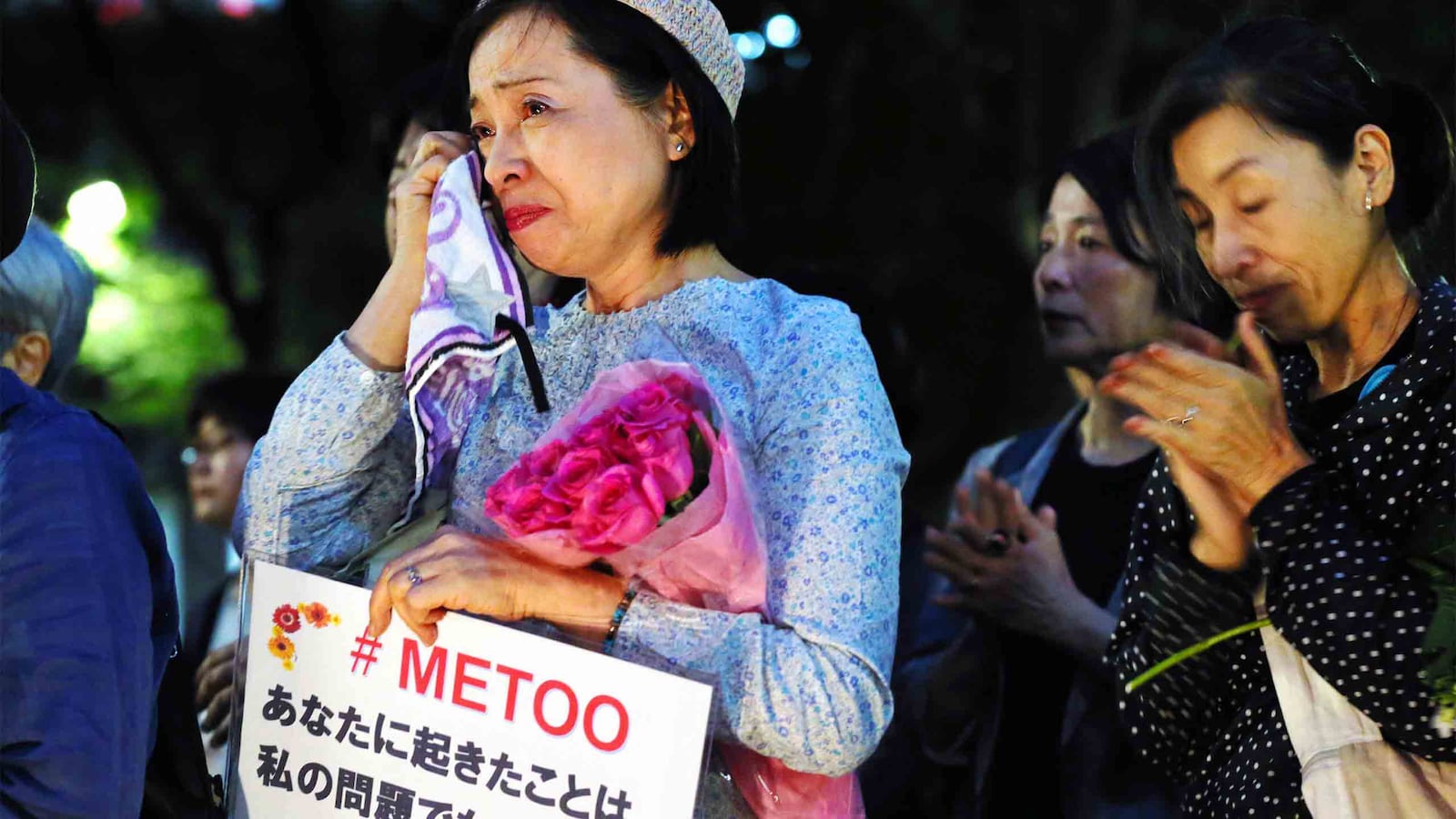TOKYO—Incest is not a crime in Japan. This may surprise some people but maybe they should be more surprised to find that rape isn’t really a prosecutable crime either—if the victim hasn’t resisted “enough.”
As far as the Japanese courts and the legal system are concerned, in a case of sexual assault, a woman’s “no” only means “no” if she backs it up with violence and loud resistance. Just since March there have been four verdicts in which the “common sense” of the male judges resulted in men accused of sexual assault walking away scot-free. And this in a country where the conviction rate is 99 percent for anyone other than a rapist.
The disconnect has not gone unnoticed.
In the last few weeks, women have been gathering all over Japan to launch “Flower Protests” demanding Japan’s lawmakers and judges reconsider flaws in a system that allows men to get away with sexual assault.
The first of the four verdicts that seemed incredibly unjust and misguided came on March 12. The Fukuoka Court found a man innocent of incapacitated rape after having sex with a woman he had gotten so drunk she lost consciousness. The judge noted that she was unable to resist but because she didn’t say anything the man mistakenly believed she had consented.
In Shizuoka Prefecture on March 19 the accused man forced a woman he’d never met to give him oral sex and injured her. He was found not guilty because the woman didn’t clearly resist and from his viewpoint, he didn’t deliberately assault her. It was a judge and jury trial and the prosecution did not appeal.
The third case March 26, and perhaps the most baffling, was the sexual assault of a 19-year-old girl by her father. The Nagoya Court judge recognized that the father had been sexually abusing her since she was in the second year of junior high school. However, the judge also concluded that while the daughter had not consented to sexual intercouse and was in a mental state that made resistance difficult, he couldn’t conclude she was so afraid that she could not refuse. He found the father not guilty.
In other words, because she didn’t sufficiently refuse the father’s sexual advances, it wasn’t actually incapacitated rape.
On March 28, in Shizuoka Prefecture, the fourth verdict, the judge decided that the testimony of a 14-year-old girl who claimed to have been raped by her father for two years was unreliable. The judge ruled in favor of the father, who was found not guilty. He was found guilty for possession of child pornography and fined $921, but the fact that the father was a child porn aficionado didn’t seem to convince the judge that he might be capable of acting on those fantasies.
In a country where it's estimated that one out of five men has seen or possessed child pornography, perhaps the judge just considered the father unlucky. The case is being appealed. The fourth case differs from all the others in that the judge didn’t even consider issues of consent, because he completely dismissed the testimony of the daughter and any corroborating evidence.
It was after the fourth verdict that writer and feminist Minori Kitahara, along with feminist publisher Akiko Matsuo and others, decided they could not let a month go by without taking action against these gross injustices and set up the flower demonstration movement.
Minori Kitahara is a force in feminism and sex positivity in Japan. She sits on the board of directors for groups such as People Against Pornography and Sexual Violence (PAPS) and her politics have gotten her into trouble with Japan’s ruling elite, which is composed mostly of cranky old men.
Kitahara opened the first female-owned adult toy store for women in Japan, Love Piece Club, in 1996. The shop later became the center of a controversy when artist Megumi Igarashi a.k.a. Rokudenashiko was arrested on public obscenity charges for releasing a 3D model of her vagina online. Kitahara, who had been displaying a plaster model of the artist’s vagina in her store, also was arrested for “distribution of obscene objects.”
For Kitahara, who has been on the front lines of the good fight for sexual equality and women’s rights for many years, these rape verdicts were reason to take action on a larger scale than ever before.
Kitahara says one of the motivating factors this time was the indifference and even hostility displayed from many in the legal profession when confronted about the verdicts. “The establishment was writing: ‘Calm down.’ ‘Have you even read the verdict?’ ‘Who are you to question a judge?’ Legal professionals were dismissive despite the fact that the judges in three out of four of these cases had acknowledged the lack of consent.”
Struck by the seeming misogyny and lack of empathy towards women that permeated the court rooms, a painfully accurate reflection of Japanese society, Kitahara and others wanted to create a safe space for women to share their stories.
The first protest was held in front of Tokyo Station in the middle of the day on April 11. The participants held flowers to show their solidarity with the victims.
“We wanted to gather in an open and bright space where we would be seen and publicly discuss what has been deemed taboo for so long.”
What she saw on that first day was encouraging. Story after story was shared by the women who came. Many had suffered in silence alone after their experiences of sexual violence. For many it was the first time to speak of their trauma at all. For some, it was the first time they realized that they had been victims—they had blamed themselves.
“It was a highly charged yet safe atmosphere and people opened up," says Kitahara. "On the spot we all agreed that this needed to happen again.”
Since then, the protests have been held in nine cities across the country, each time growing in numbers. Even Japan’s state controlled media, NHK, has given the movement grudging coverage. Gradually, men have joined the protesters and accounted for roughly a tenth of the participants at last week’s demonstration
Kitahara explains that the shoddy treatment of women who had clearly not consented to sex isn’t just a problem in Japan’s judicial system:
“The commodification of women is so deeply rooted in Japanese society, that it is even an integral part of the economy. So judges and men, fail or perhaps refuse to see, that a woman is their equal, deserving of any rights or dignity. The only way to tackle this is to share our stories, pour our pain into the public sphere. [We must] come together united in our resolve to change public opinion, united in our hopes to change the laws and the systems all the way down to our daily lives.”

A ‘Flower Demonstration’ against court rulings acquitting sexual offenders is held near Tokyo Station on June 11, 2019, in Tokyo, Japan.
The Asahi Shimbun/GettyAccording to a study on “violence between men and women” by the Cabinet Office in 2017, 7.8 percent of women (1 in 13) and 1.5 percent of men (1 in 67) have experienced forced sex without consent. Yet, the number of officially reported rape cases each year hovers below 1,400.
In 2017, after journalist Shiori Ito raised a clamor about Japan’s century-old rape laws, the Japanese parliament finally passed legislation that included harsher penalties. The revised legislation also recognized that men could be sexually assaulted.
But the laws retained controversial requirements that prosecutors must prove that violence or intimidation was involved, or that the victim was "incapable of resistance” for a conviction. The four acquittals have revived outrage over this dubious legal standard.
Many experts have pointed out that there are certainly circumstances in which resistance could result in death and that many victims freeze when a sexual assault happens. The demonstrators want the laws to be revised so that non-consensual sex is a crime.
In Germany, where rape legislations had similarly lagged behind other developed countries, a law that clarified “no means no” was passed unanimously in 2016. Under the previous legislation, a verbal “no” was not enough to constitute a rape, and signs of physical resistance from the victim were necessary. The proposal for the German reform came about in March 2016, right after the New Year’s Eve attacks in Cologne and the public outrage that followed. This reform broadened the legal definition of sexual assault even including groping as a sexual offense, aiming to close all blatant loopholes in sexual assault crimes and making it easier for victims to file criminal complaints.
In Japan, the change in the laws have indeed resulted in a rise in cases of reported rape, but it’s become obvious that the laws are still flawed.
Former journalist-turned-criminal defense attorney Sakura Kamitani says, “Japan doesn’t adequately address cases of sexual assault where there was simply no consent from the victim without any threats of violence. I do believe that at least three of these four cases, where the judge recognized there was no consent, should have resulted in guilty verdicts, even with the current laws, but there is definitely room for improvement.” In the fourth case, in which a pre-teen girl was allegedly assaulted by her father, even the act of rape was not recognized by the court, so the judgment on consent wasn’t part of the verdict.
If there is good news, as she points out, it’s that Japan saw a total of 601 reported rape cases (including incapacitated rape) in the first half of 2018—26.8 percent more than during the same period the previous year, according to the National Police Agency (NPA).
Bringing the cases to court is a different matter. Japanese prosecutors, who pride themselves on a 99-percent conviction rate, still generally drop 50 percent of cases involving sexual assault.
One prosecutor, who was not authorized to speak publicly, told The Daily Beast, “Losing a case is a career killer in the eyes of many of my colleagues. Thus, when you have four cases in a row of not-guilty verdicts in sexual assault cases, you may see a chilling effect on what gets prosecuted. The strict standard set by three of the four rulings, which is that the victim must clearly resist, sets a dangerous precedent. It may mean that prosecutors start practicing self-censorship and punt on cases that are in the technical grey zone.”
To Kamitani, this is unacceptable. “The prosecutors are the only ones who can indict and the public depends on them to do the right thing. They need to do their jobs. I’ll tell you what I do know. The judiciary here is very sensitive to public opinion and they are worried. They should be.” She says that she’s considering showing up at the coming demonstration on July 11 herself.
The current ruling coalition of Japan, led by Prime Minister Shinzo Abe, seems oblivious to the protests for the time being. This may be understandable when you consider that high ranking officials in the same administration, possibly even Abe himself, have derailed a sexual assault investigation and stopped a suspect from being arrested on rape charges. Japan’s top politicians routinely take a cavalier attitude to sexual harassment and sexual assault.
Shiori Ito, who broke the silence about sexual assault in Japan and the ordeal of women who dare to pursue a rape case in the criminal court system, sees the flower demonstrations as major step forward. She initially had to gather evidence and testimony herself before she could finally convince the police to do their job and investigate. She told The Daily Beast, “I am happy that now we are finally standing up together, to raise our voices together. We must keep speaking out until we are heard. Now is the time to review our judicial system.”
A petition to Japan’s Justice Minister, demanding that the laws related to sexual assault be reformed and improved, has now gained over 44,000 signatures. The question the petitioners ask is very simple but it’s one that reporters in Japan should be asking every day:
Recently many sexual violence cases have continued to see acquittals. Moreover, beyond the acquittals, there are countless numbers of cases where, even if women report being sexually assaulted to the police, the police do not take up their cases. And even if the police investigate the cases, often they will go unprosecuted. Why aren’t perperators of sexual assault being punished?
“Up until now,” says Kamitani, “women have been forced to just weep and forget what happened. But this time around, they aren’t letting up. This protest has risen organically in response to messages from the courts that they aren’t ‘resisting enough,’ and it continues to gain momentum as public support grows.”
The resistance of the Flower Movement will continue until the courts and the cabinet have finally had enough, and take action. Because the women in this country have had enough already.








